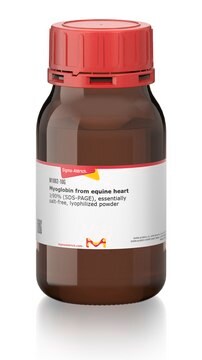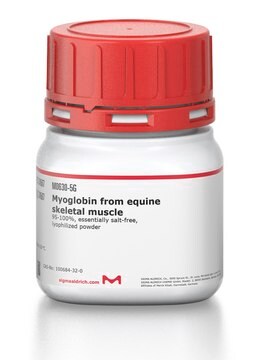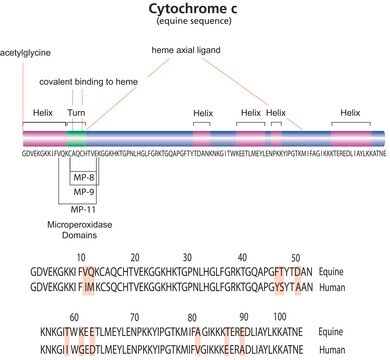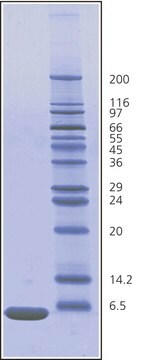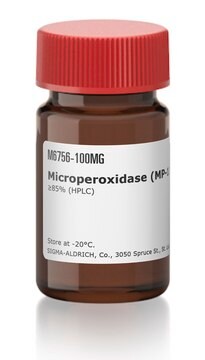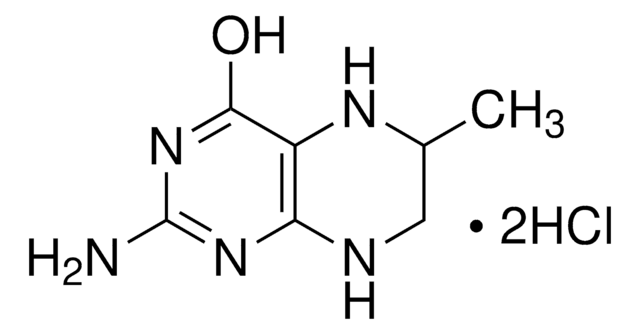C2037
Cytochrome c from bovine heart
≥95% based on Mol. Wt. 12,327 basis
About This Item
Recommended Products
biological source
bovine heart
Assay
≥95% based on Mol. Wt. 12,327 basis
form
powder or crystals
mol wt
12327 Da
technique(s)
cell based assay: suitable
suitability
suitable for molecular biology
UniProt accession no.
application(s)
cell analysis
storage temp.
−20°C
Gene Information
cow ... CYC1(512500)
Looking for similar products? Visit Product Comparison Guide
General description
Application
- for cytochrome oxidase staining using the mice brain tissue
- as a component of control mixture to evaluate the accuracy of tandem mass spectra in identifying peptides
- to study its effect on the stability, transport, and retention of biochar colloids (BCs) in saturated porous media under various solution pH and ionic strength (IS) conditions
- as a component of staining solution for the detection of cytochrome oxidase activity in the brain tissue sections of mouse
- as a component in the assay to study its superoxide scavenging efficiency
- as a component of serum-free DMEM media to evaluate non-specific cytochrome C reduction in astrocytes and HT-29 cells
Biochem/physiol Actions
Cytochrome c has been identified as an important mediator in apoptotic pathways. The release of mitochondrial cytochrome c into the cytoplasm stimulates apoptosis and is commonly used as an indicator of the apoptotic process in the cell. Investigation on the effect of Paris Saponin I (PS I) on human gastric carcinoma cell growth (SGC7901 cells) have shown an elevated level cytoplasmic cytochrome c. Results are an inhibition of proliferation in SGC7901 cells by inducing mitochondria-dependent apoptosis through cytochrome.
Preparation Note
Other Notes
Storage Class Code
11 - Combustible Solids
WGK
WGK 3
Flash Point(F)
Not applicable
Flash Point(C)
Not applicable
Personal Protective Equipment
Choose from one of the most recent versions:
Already Own This Product?
Find documentation for the products that you have recently purchased in the Document Library.
Customers Also Viewed
Articles
Separation of Ribonuclease A from bovine pancreas, Type I-A, powder, ≥60% RNase A basis (SDS-PAGE), ≥50 Kunitz units/mg protein; α-Chymotrypsinogen A from bovine pancreas, essentially salt-free, lyophilized powder; Cytochrome c from bovine heart, ≥95% based on Mol. Wt. 12,327 basis; Lysozyme from chicken egg white, lyophilized powder, protein ≥90 %, ≥40,000 units/mg protein
Learn about the four membrane-bound protein complexes that make up the electron transport chain metabolic pathway supplying energy as ATP for cellular respiration.
Separation of Ribonuclease A from bovine pancreas, Type I-A, powder, ≥60% RNase A basis (SDS-PAGE), ≥50 Kunitz units/mg protein; α-Chymotrypsinogen A from bovine pancreas, essentially salt-free, lyophilized powder; Cytochrome c from bovine heart, ≥95% based on Mol. Wt. 12,327 basis; Lysozyme from chicken egg white, lyophilized powder, protein ≥90 %, ≥40,000 units/mg protein
Separation of Ribonuclease A from bovine pancreas, Type I-A, powder, ≥60% RNase A basis (SDS-PAGE), ≥50 Kunitz units/mg protein; α-Chymotrypsinogen A from bovine pancreas, essentially salt-free, lyophilized powder; Cytochrome c from bovine heart, ≥95% based on Mol. Wt. 12,327 basis; Lysozyme from chicken egg white, lyophilized powder, protein ≥90 %, ≥40,000 units/mg protein
Chromatograms
application for HPLCapplication for HPLCapplication for HPLCOur team of scientists has experience in all areas of research including Life Science, Material Science, Chemical Synthesis, Chromatography, Analytical and many others.
Contact Technical Service
